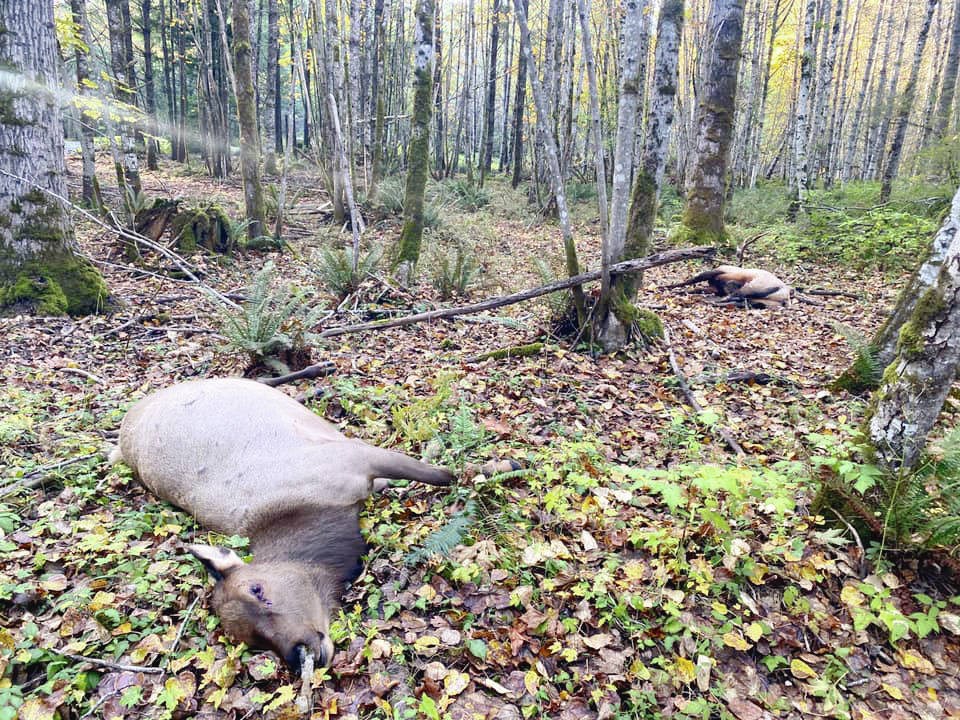The illegal killing of Roosevelt elk on Vancouver Island continues to pose a threat to a population already listed as being of special concern in B.C.
Two more elk were found dead near Nanaimo a week ago following a spike in killings last spring that highlighted a persistent problem on the Island.
The B.C. Conservation Officer Service is asking for the public’s help in solving the latest incident, which took place on the morning of Oct. 22 along Spruston Road.
It’s a well-travelled route and officers are hoping that a motorist or resident might have seen something or have dash-cam footage that could assist investigators.
Dave Judson, president of the Ladysmith Sportsmen’s Club, said the killings were discovered by his cousin, who noticed the herd off Spruston Road on her way to work that morning. On her way home later in the day, she spotted what appeared to be a dead elk in the same area and contacted Judson, who alerted the B.C. Conservation Officer Service.
Judson said it appears the elk — a bull and a cow — were shot from the road.
“That’s what’s scary,” he said. “There’s houses right around and the corner and those rifle cartridges can travel a long distance.”
Judson said there was no attempt to take the meat from the dead animals and it’s unlikely that would have been possible anyway, given the location and the time it would have taken to field dress animals of that size.
“They obviously didn’t shoot it for meat,” he said. “If somebody’s starving and they harvested a deer to feed their family, that’s one thing. But to take two large animals like that on the side of the road? And that is a busy road with the commercial traffic, so it’s not like they weren’t going to get seen.”
Jesse Zeman, director of fish and wildlife restoration with the B.C. Wildlife Federation, said the poaching of Roosevelt elk continues to undermine one of the few conservation success stories in B.C.
After being nearly wiped out in the early 1900s, Roosevelt elk have recovered to the point where some of the animals have been moved from Vancouver Island and reintroduced to the mainland where they were extirpated by over-hunting and human settlement.
There are more than 3,000 elk on the Island now, but they remain a blue-listed species of special concern.
“If we have people out poaching or harvesting more animals than the population sustainably reproduces, then we end up in a deficit,” Zeman said. “In that area where those two elk were shot, that population was actually doing quite well, but there have been a number of reports of poaching in the area.”
In some locations, the poaching has got so bad that limited-entry legal hunting has been suspended.
“We have these areas, like around Port Alberni as well, where the elk are being poached at an unsustainable rate,” Zeman said. “The result of that is there’s no hunting for licensed hunters. So, in that case, the people who are following the rules and are trying to hunt sustainably are being punished by people who are not.”
The B.C. Wildlife Federation tries to prevent poaching by offering rewards of up to $2,000 for information that leads to a conviction.
They also introduced a conservation app that allows users to report illegal activities and take time-stamped videos or photographs. The app accesses the phone’s GPS system to pinpoint the exact location of an incident for conservation officers.
As well, the federation is part of a coalition of conservation and environmental groups urging the provincial government to step up its investment in conserving wildlife and habitat.
“Given B.C.’s biodiversity, we are the most poorly funded jurisdiction in North America when it comes to fish and wildlife resources,” Zeman said.
And the effects are being felt all over the province, he said. “We’re seeing that in chinook salmon. We’re seeing that in record-low moose populations, endangered caribou, killer whales.
“That’s about a lack of investment in conserving our resources.”
As a result, conservation officers and biologists are stretched too thin trying to enforce ever expanding regulations. “Their job has become exponentially harder with fewer dollars to do it,” he said.
In the latest poaching incident, the B.C. Conservation Officer Service is appealing for the public’s help and asking anyone with information to contact the Report All Poachers and Polluters (RAPP) line at 1-877-952-7277.



